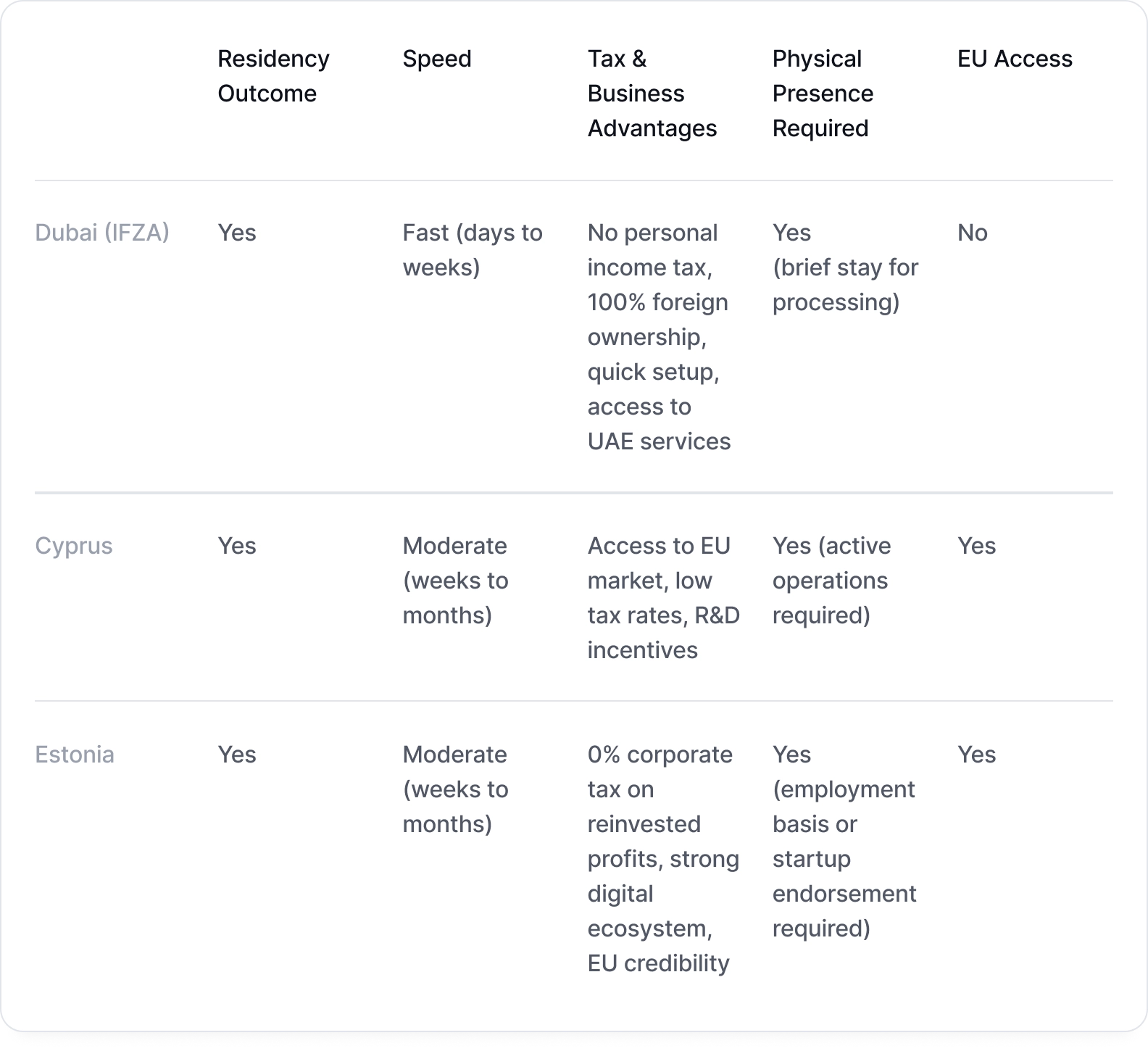
Beyond Incorporation: Jurisdictions That Offer Residency Through Company Formation
Many entrepreneurs think about company incorporation purely as a legal or operational step. But in some jurisdictions, forming a company can do more than give you a corporate structure — it can also open the door to residency. This is an appealing route for founders who want to work and access services in another country without going through traditional immigration programs.
Dubai – Residency Through IFZA Company Formation
How It Works
Dubai’s International Free Zone Authority (IFZA) is one of the most popular choices for entrepreneurs who want both a business presence in the UAE and a pathway to residency. The process is straightforward: you set up a company in IFZA, and as the owner, you can apply for a UAE residency visa (specifically an employment visa through your own business). For more details, check out this article. Once your company is registered, you complete a few formalities:
- Apply for an establishment card for your company.
- Submit your visa application.
- Travel to the UAE for medical testing and biometrics.
- Receive your Emirates ID, which acts as your proof of residency.
The visa is valid for two years and can be renewed as long as your company remains active.
Benefits
- 100% foreign ownership and no local sponsor needed.
- Quick setup: company registration can take approximately a week.
- Access to UAE services, including local banking, driver’s license, and family sponsorship.
- Tax advantages: in most cases no income tax and a competitive corporate tax regime.
- Strategic location: a global hub with strong connectivity.
Considerations
- You must physically visit Dubai to complete the medical and Emirates ID steps.
- Residency is tied to your company’s activity and visa renewals. If either lapses, your residency terminates.
For founders looking for a combination of tax efficiency, market access, and real residency status, Dubai via IFZA is one of the fastest and most reliable options.
Cyprus – Residency Through Business and Investment
Cyprus offers a compelling route for non‑EU founders through its Startup Visa Scheme, designed to attract high‑growth, innovative entrepreneurs. The program is available to both individuals and teams of up to five non‑EU founders or senior executives applying together Applicants can qualify under two categories:
- Category A is designed for early-stage or pre-revenue startups, defined as having less than €1 million in revenue. Here, the business plan must pass an innovation assessment by two independent experts.
- Category B is aimed at more established ventures with at least €1 million in revenue and a proven track record of investing at least 10% of operating costs into research and development for one of the past three years.
Renewal is performance-based. The business must demonstrate tangible results such as revenue growth, attracting investment, creating full-time local jobs, launching a new product, or participating in a local accelerator program.
Benefits
- EU market access: Once a resident of Cyprus, you can enjoy certain EU business advantages such as EU funding programs, easier cross-border partnerships, and improved opportunities for attracting investment.
- Stable and reputable jurisdiction.
- Attractive personal tax regime, including exemptions for foreign income in some cases.
Considerations
- Unlike Dubai, the process isn’t instant. Cyprus typically requires more substantial investment and real operations.
- Residency isn’t automatic from incorporation. You need to meet immigration program requirements.
Cyprus can make sense for founders who want to be physically based in the EU and are prepared to invest in building a real presence there.
Estonia – Blue Card Pathway for Startup Founders
Estonia is often associated with its e-Residency program, but this is a common misconception: e-Residency is a digital ID that allows you to register and manage a company online, not a right to live or work in the country. For entrepreneurs who actually want to relocate, one of the most relevant options is the EU Blue Card, which Estonia issues to highly skilled professionals, including startup founders who structure their role appropriately.
The Blue Card grants the right to live and work in Estonia and is typically issued for up to four years, with the option to renew. To qualify, a founder must hold an employment contract or binding job offer with an Estonian company, which can include their own startup if it meets the legal requirements.
Benefits
- Residency rights: Live and work in Estonia with your family members.
- EU mobility: After a certain period, Blue Card holders can move to another EU country under simplified conditions.
- Long-term perspective: Blue Card time counts toward permanent residence and eventually citizenship if other conditions are met.
- Startup-friendly ecosystem: Estonia’s thriving digital infrastructure and supportive startup ecosystem make it an attractive place to base operations once physically present.
Considerations
- Salary threshold challenge: Meeting the 1.5x average salary requirement can be difficult for very early-stage startups that operate on lean budgets.
- Qualification requirements: Founders must demonstrate higher education or equivalent experience. Self-taught entrepreneurs without formal degrees may face additional scrutiny.
How They Compare
Below is a quick overview of jurisdictions that offer residency options for entrepreneurs and business founders, along with their key requirements and benefits.

Final Thoughts
Forming a company abroad can be much more than a legal step. It can be a strategic move that changes where you live, how you work, and the markets you can access.
- Choose Dubai if you want fast, straightforward residency with strong tax benefits and a global hub location.
- Consider Cyprus if you aim for EU residency and are willing to commit real investment and presence.
- Look at Estonia if your goal includes relocating with your family and gaining a path to long-term residence.
Each option comes with different benefits and obligations, so the best choice depends on whether your goal is physical relocation, market access, or simply operational flexibility.












